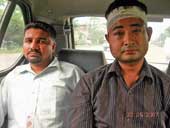 |
| Binodini Devi (right) with Assamese litterateur Mamoni Raisom Goswami. Pictures by S.H. Patgiri |
Binodini Devi
At 80, Manipur’s princess, Maharaj Kumari Binodini Devi, is a role model for women. A renowned literary figure and a crusader for women’s rights, Binodini Devi is also one who speaks her mind, and without fear or favour. Born on February 6, 1922, the spirited Maharaj Kumari has been witness to several historical events, including the transfer of power from monarchy to democracy in 1948 and the merger of Manipur with the Indian Union in 1949.
Binodini Devi is one who takes great pride in her land and its people. It was the lady, who along with renowned theatre personality Ratan Thiyam, returned their Padmashree awards to the President last year in protest against the Centre’s decision to extend the territorial jurisdiction of the ceasefire with the National Socialist Council of Nagalim (Isak-Muivah) to Manipur.
Binodini Devi is also a believer in the great power of Manipuri women, which she says was demonstrated in the first Nupi Lal (women’s agitation) in 1904. “Manipur was conquered by the British in 1891 and in 1904, the women of the land stood up against the British rulers. It was a spontaneous movement,” she asserts.
“Women here have self-pride and are economically sound. Every woman in Manipur has inherited a pride and knows that she can lead a life without a man. They have been independent since time immemorial,” says the princess.
The youngest daughter of Maharaja Churachand Singh and Dhanamanjuri Devi, Binodini Devi completed her graduation in arts from Calcutta University, after which she studied at the Kala Bhawan in Visva Bharati University in Shantiniketan. Her schooldays were, however, largely spent in Shillong and Nawadip though she completed her matriculation in 1938-39 from Tamphasana Girls’ High School in Manipur.
It is at Tamphasana that the Maharaj Kumari entered the world of literature. “I began writing during my school days at Tamphasana. However, my first book, Nungairakta Chandramukhi, a compilation of short stories, was published only in 1965,” the princess says. Nungairakta Chandramukhi went on to win Manipur’s most prestigious literary award, the Jamini Sunder Guha gold medal, the same year. And till today she remains the lone woman author to have won the medal.
“Assamese women writers are now shining bright on the literary horizon, which is a good sign for the region. Several Manipuri women writers are also showing their mettle and I feel that their male counterparts should begin to recognise the quality of their writings. The Manipuri Sahitya Parishad also has a role to play in this regard,” she says. What worries her, however, is the pathetic lack of publishers in the state.
Fame kissed Binodini Devi’s feet in the Seventies after the publication of her novel, Bor Saheb Ongbi Sanatombi, based on the life of a princess who falls in love with a British political agent. Despite the novel sparking a controversy in Manipuri society, the princess stood firm in projecting the inner power of womanhood. This powerful novel won the Sahitya Akademi award in 1979.
The crusader in the princess comes across in her strong statements on the status of Manipuri women. “Manipuri society’s gender balance is very strong and this is what helps women march ahead in various fields. Women vendors in Imphal’s Nupi Keithel (women’s market) are a good example. These are the women who have spearheaded several agitations in the state,” she says.
Binodini Devi feels that women of the state have always managed to steer clear of the male-dominated culture “imposed on them”. Even divorcees and widows enjoy equal respect and widow remarriage is accepted with grace in the state.
This feminist princess had dreamt that in the 21st century, Manipuri women would grow more. Today, however, she is disillusioned. She is “just beginning to discover” a new brand of Manipuri women who, though educated, do not appreciate their roots. “The modern woman is confused about her status. She allows it to be lowered. Corruption has made inroads among Manipuri women. Often we find ministers’ wives asking for bribes. This ‘memsaheb culture’ has brought disaster for our women,” she laments.
The princess has been deeply associated with Manipuri films since 1971. She has written the screenplays of all major films by Manipuri filmmaker Aribam Syam Sharma, including the National Award winners, Olangthagi Wangmadashu, Sanabi and Paokhum Ama and Imagee Ningthem, which won the Grand Prix award at Nantes in 1983. She has also written the screenplays of Ishanou, which got an invitation to the famous Cannes film festival. Sanabi is based on a short story, Sagol Sanabi, from her first publication Nungairakta Chandramukhi.
Binodini Devi’s ballet Keibul Lamjao, based on the threat to the sangai, the endangered brow-antlered deer, was also made into a documentary film by Sharma. Produced by the Sangeet Natak Akademi, the film, The Dancing Deer of Manipur, won the World Wildlife Film Award in the US. Her other ballets include Thoibi, Kong-Hangoi and Loktak.
Binodini Devi was married to L. Nandababu Roy, a Manipuri surgeon, and has two sons — Devabrata and Somi. While Devabrata heads a human rights research group called the Centre of Research and Education (CORE), Somi is curator of a New York museum.
Though Binodini Devi has reached a ripe old age, her spirit remains as “young as ever”. Her latest book, Ho Mexico, Ho Mexico, a travelogue based on her trip to America and Europe, will be published shortly. “Many of my writings have not been published. I love writing on real-life incidents and happenings. However, I do not think it is compulsory to publish all,” she says.










